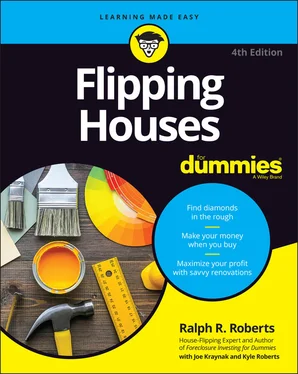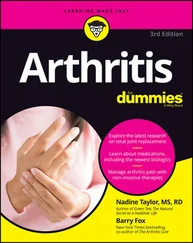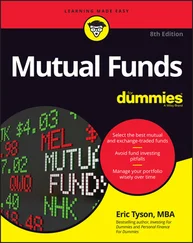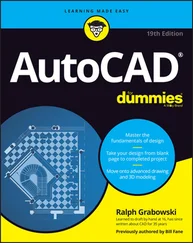Ralph R. Roberts - Flipping Houses For Dummies
Здесь есть возможность читать онлайн «Ralph R. Roberts - Flipping Houses For Dummies» — ознакомительный отрывок электронной книги совершенно бесплатно, а после прочтения отрывка купить полную версию. В некоторых случаях можно слушать аудио, скачать через торрент в формате fb2 и присутствует краткое содержание. Жанр: unrecognised, на английском языке. Описание произведения, (предисловие) а так же отзывы посетителей доступны на портале библиотеки ЛибКат.
- Название:Flipping Houses For Dummies
- Автор:
- Жанр:
- Год:неизвестен
- ISBN:нет данных
- Рейтинг книги:3 / 5. Голосов: 1
-
Избранное:Добавить в избранное
- Отзывы:
-
Ваша оценка:
- 60
- 1
- 2
- 3
- 4
- 5
Flipping Houses For Dummies: краткое содержание, описание и аннотация
Предлагаем к чтению аннотацию, описание, краткое содержание или предисловие (зависит от того, что написал сам автор книги «Flipping Houses For Dummies»). Если вы не нашли необходимую информацию о книге — напишите в комментариях, мы постараемся отыскать её.
Flipping Houses For Dummies
Flipping Houses For Dummies
Flipping Houses For Dummies
Flipping Houses For Dummies — читать онлайн ознакомительный отрывок
Ниже представлен текст книги, разбитый по страницам. Система сохранения места последней прочитанной страницы, позволяет с удобством читать онлайн бесплатно книгу «Flipping Houses For Dummies», без необходимости каждый раз заново искать на чём Вы остановились. Поставьте закладку, и сможете в любой момент перейти на страницу, на которой закончили чтение.
Интервал:
Закладка:
Adding a Real Estate Lawyer to the Roster
Not all lawyers are created equal. You can find attorneys who specialize in divorce, disability, criminal law, personal injury, corporate law, and so on. When you’re flipping properties, you want a real estate lawyer. An experienced real estate lawyer can offer valuable assistance in the following areas:
Purchase agreement: Purchase agreements are complex documents that cover not only the sale price but also the terms of sale — tax prorations, occupancy issues, water bills, personal property in the house, and so on. Unless it’s in writing, a purchase agreement is subject to dispute. Inexperienced real estate agents (who aren’t lawyers) often introduce errors that can cost their clients hundreds or thousands of dollars.
Title: Your lawyer can advise you on the best way to take title in your situation. For example, you may want only your name on the title or your name and your spouse’s name if you’re married. A lawyer can also inspect the title work to ensure your protection. (For more details, see the earlier section “ Covering Your Back with Title and Homeowner’s Insurance.”)
Complex transactions: Some transactions may include an assumption of the mortgage or enable the seller to finance the purchase. When complexities arise, having a lawyer on call is always a plus.
 To find a qualified real estate lawyer, ask your real estate agent, friends, and family for referrals or contact your local bar association. Don’t resort to merely picking a name out of a phone book — unless you have to. The ideal candidate possesses the following qualities:
To find a qualified real estate lawyer, ask your real estate agent, friends, and family for referrals or contact your local bar association. Don’t resort to merely picking a name out of a phone book — unless you have to. The ideal candidate possesses the following qualities:
Efficient and affordable: Attorneys often charge by the minute, so beware of long talkers.
Supportive: Someone who second-guesses all your investment decisions can paralyze you with doubt.
Unobtrusive: Your lawyer should protect you from unseen risk without sinking the deal. Some lawyers justify their fee by becoming too technical with the documents, which can hinder your ability to close on good deals while annoying the heck out of you.
Available: A good lawyer is available when needed.
Experienced: A real estate attorney who owns real estate and rentals is better than one who doesn’t.
Generous: A lawyer who shares leads can help you find properties you couldn’t find on your own.
 Lawyer fees can range from a hundred dollars to a couple thousand dollars. Compare rates and services closely and be sure to consult a lawyer who specializes in real estate.
Lawyer fees can range from a hundred dollars to a couple thousand dollars. Compare rates and services closely and be sure to consult a lawyer who specializes in real estate.
Lining Up a Home Inspector
In a buyer’s market, whenever you make an offer on a house, make the offer contingent on the house passing inspection. Then have the home professionally inspected. This contingency ensures that you don’t get stuck holding the bag on any of the following big-ticket items:
Damaged foundation or other structural anomalies
Electrical wiring problems
Poor plumbing or aging septic systems, especially if the house has been vacant for some time
Leaking, nonfunctioning, or nonexistent gas lines
Poorly functioning furnace or central air conditioning units
Leaking or ramshackle roof
Termite or other critter damage
Health hazards, such as lead-based paint, toxic mold, radon gas, asbestos, and hazardous insulation
Neighboring structures built on your property — always check the survey to make sure that the homeowner didn’t allow the neighbor to build a new garage ten feet over on your property
In a seller’s market, a home inspection contingency can backfire on you. If the seller receives two comparable offers, one of which waives the inspection, guess which one the seller will accept? Yes, it’s the one without the contingency. In lieu of having a professional inspection, have your contractor or handyperson look at the house with you when you go to see it.
 Although most buyers hire private home inspectors, I prefer using city inspectors because they tend to be more thorough and they’re well versed on local building codes. The city inspectors in my area show up as a team that typically includes a plumber, an electrician, a heating and air conditioning specialist, a builder, and someone who specializes in zoning. Your house receives a thorough inspection and a complete write-up for about the same price you pay a private inspector. If the inspection uncovers problems, you can sign off on the recommendations, agreeing to make the necessary repairs after you take possession. However, not all towns and cities offer inspections, and some offer them only for new homes, so this option may not be available to you.
Although most buyers hire private home inspectors, I prefer using city inspectors because they tend to be more thorough and they’re well versed on local building codes. The city inspectors in my area show up as a team that typically includes a plumber, an electrician, a heating and air conditioning specialist, a builder, and someone who specializes in zoning. Your house receives a thorough inspection and a complete write-up for about the same price you pay a private inspector. If the inspection uncovers problems, you can sign off on the recommendations, agreeing to make the necessary repairs after you take possession. However, not all towns and cities offer inspections, and some offer them only for new homes, so this option may not be available to you.
If a team of city inspectors isn’t an option, have your contractor do a walk-through. Having someone inspect the home who can personally make the fixes is best, assuming that the person is trustworthy — you don’t want a contractor who recommends upgrades merely to keep the work crew busy and jack up your costs. The goal of the inspector should be to recommend repairs that make the house marketable and not overlook any major/costly defects.
 If you decide to go with a home inspector, you can track down qualified candidates by visiting the National Association of Certified Home Inspectors (NACHI) at
If you decide to go with a home inspector, you can track down qualified candidates by visiting the National Association of Certified Home Inspectors (NACHI) at www.nachi.org . When you have a few leads, contact your candidates and ask them the following questions:
Are you certified, licensed, and insured? Certification and licensing ensure that the inspector has the basic qualifications for the job. Insurance covers any serious overlooked defects.
How long have you been a home inspector? Length of service is often, but not always, a good indication of experience and expertise.
How many homes have you inspected? “One or two” isn’t the answer you’re looking for. A busy home inspector is usually busy as a result of being good.
What did you do before becoming a home inspector? Someone who’s a retired carpenter or home builder is probably a better candidate than, say, a burned-out dance instructor.
Do you have references I can call? If the inspector has a good track record, people don’t hesitate to provide positive references.
Do you recommend remedies or simply identify problems? Look for an inspector who’s had experience in construction. The builder who constructed my home made an excellent home inspector and actually moved into this field full-time. His approach was to not only point out problems but also recommend repairs and renovations.
 You don’t want a home inspector who makes mountains out of molehills — that can deflate your balloon of enthusiasm with a thousand pinholes. Don’t nitpick a great deal. A homeowner who’s selling a property at a clearance price often does so to avoid the costs and headaches of making repairs. Nitpicking can ruin your chances of acquiring an attractive piece of property.
You don’t want a home inspector who makes mountains out of molehills — that can deflate your balloon of enthusiasm with a thousand pinholes. Don’t nitpick a great deal. A homeowner who’s selling a property at a clearance price often does so to avoid the costs and headaches of making repairs. Nitpicking can ruin your chances of acquiring an attractive piece of property.
Also, never hire a family member or friend as a home inspector — even if qualified — because that person will become The Expert and tell you what you’re doing right and wrong, without fully understanding the project and what you’re trying to accomplish.
Читать дальшеИнтервал:
Закладка:
Похожие книги на «Flipping Houses For Dummies»
Представляем Вашему вниманию похожие книги на «Flipping Houses For Dummies» списком для выбора. Мы отобрали схожую по названию и смыслу литературу в надежде предоставить читателям больше вариантов отыскать новые, интересные, ещё непрочитанные произведения.
Обсуждение, отзывы о книге «Flipping Houses For Dummies» и просто собственные мнения читателей. Оставьте ваши комментарии, напишите, что Вы думаете о произведении, его смысле или главных героях. Укажите что конкретно понравилось, а что нет, и почему Вы так считаете.












